- Home
- J. R. R. Tolkien
The Fall of Gondolin Page 4
The Fall of Gondolin Read online
Page 4
Then Ulmo arose and spoke to him and for dread he came near to death, for the depth of the voice of Ulmo is of the uttermost depth: even as deep as his eyes which are the deepest of all things. And Ulmo said: ‘O Tuor of the lonely heart, I will not that thou dwell for ever in fair places of birds and flowers; nor would I lead thee through this pleasant land, but that so it must be. But fare now on thy destined journey and tarry not, for far from hence is thy weird set. Now must thou seek through the lands for the city of the folk called Gondothlim or the dwellers in stone, and the Noldoli shall escort thee thither in secret for fear of the spies of Melko. Words I will set to your mouth there, and there you shall abide awhile. Yet maybe thy life shall turn again to the mighty waters; and of a surety a child shall come of thee than whom no man shall know more of the uttermost deeps, be it of the sea or of the firmament of heaven.’
Then spoke Ulmo also to Tuor some of his design and desire, but thereof Tuor understood little at that time and feared greatly. Then Ulmo was wrapped in a mist as it were of sea-air in those inland places, and Tuor, with that music in his ears, would fain return to the regions of the Great Sea; yet remembering his bidding turned and went inland along the river, and so fared till day. Yet he that has heard the conches of Ulmo hears them call him till death, and so did Tuor find.
When day came he was weary and slept till it was nigh dusk again, and the Noldoli came to him and guided him. So fared he many days by dusk and dark and slept by day, and because of this it came afterwards that he remembered not over well the paths that he traversed in those times. Now Tuor and his guides held on untiring, and the land became one of rolling hills and the river wound about their feet, and there were many dales of exceeding pleasantness; but here the Noldoli became ill at ease. ‘These,’ said they, ‘are the confines of those regions which Melko infesteth with his Goblins, the people of hate. Far to the north – yet alas not far enough, would they were ten thousand leagues – lie the Mountains of Iron where sits the power and terror of Melko, whose thralls we are. Indeed in this guiding of thee we do in secret from him, and did he know all our purposes the torment of the Balrogs would be ours.’
Falling then into such fear the Noldoli soon after left him and he fared alone amid the hills, and their going proved ill afterwards, for ‘Melko has many eyes’, it is said, and while Tuor fared with the Gnomes they took him twilight ways and by many secret tunnels through the hills. But now he became lost, and climbed often to the tops of knolls and hills scanning the lands about. Yet he might not see signs of any dwelling of folk, and indeed the city of the Gondothlim was not found with ease, seeing that Melko and his spies had not even yet discovered it. It is said nonetheless that at this time those spies got wind thus that the strange foot of Man had been set in those lands, and that for that Melko doubled his craft and watchfulness.
Now when the Gnomes out of fear deserted Tuor, one Voronwë or Bronweg followed afar off despite his fear, when chiding availed not to enhearten the others. Now Tuor had fallen into a great weariness and was sitting beside the rushing stream, and the sea-longing was about his heart, and he was minded once more to follow this river back to the wide waters and the roaring waves. But this Voronwë the faithful came up with him again, and standing by his ear said: ‘O Tuor, think not that but thou shalt again one day see thy desire; arise now, and behold, I will not leave thee. I am not of the road-learned of the Noldoli, being a craftsman and maker of things made by hand of wood and of metal, and I joined not the band of escort till late. Yet of old have I heard whispers and sayings said in secret amid the weariness of thraldom, concerning a city where Noldoli might be free could they find the hidden way thereto; and we twain may without a doubt find a road to the City of Stone, where is that freedom of the Gondothlim.’
Know then that the Gondothlim were that kin of the Noldoli who alone escaped Melko’s power when at the Battle of Unnumbered Tears he slew and enslaved their folk and wove spells about them and caused them to dwell in the Hells of Iron, faring thence at his will and bidding only.
Long time did Tuor and Voronwë seek for the city of that folk, until after many days they came upon a deep dale amid the hills. Here went the river over a very stony bed with much rush and noise, and it was curtained with a heavy growth of alders; but the walls of the dale were sheer, for they were nigh to some mountains which Voronwë knew not. There in the green wall that Gnome found an opening like a great door with sloping sides, and this was cloaked with thick bushes and long-tangled undergrowth; yet Voronwë’s piercing sight might not be deceived. Nonetheless it is said that such a magic had its builders set about it (by aid of Ulmo whose power ran in that river even if the dread of Melko fared upon its banks) that none save of the blood of the Noldoli might light on it thus by chance; nor would Tuor have found it ever but for the steadfastness of that Gnome Voronwë. Now the Gondothlim made their abode thus secret out of dread of Melko; yet even so no few of the braver Noldoli would slip down the river Sirion from those mountains, and if many perished so by Melko’s evil, many finding this magic passage came at last to the City of Stone and swelled its people.
Greatly did Tuor and Voronwë rejoice to find this gate, yet entering they found there a way dark, rough-going, and circuitous; and long time they travelled faltering within its tunnels. It was full of fearsome echoes, and there a countless stepping of feet would come behind them, so that Voronwë became adread, and said: ‘It is Melko’s goblins, the Orcs of the hills.’ Then would they run, falling over stones in the blackness, till they perceived it was but the deceit of the place. Thus did they come, after it seemed a measureless time of fearful groping, to a place where a far light glimmered, and making for this gleam they came to a gate like that by which they had entered, but in no way overgrown. Then they passed into the sunlight and could for a while see nought, but instantly a great gong sounded and there was a clash of armour, and behold, they were surrounded by warriors in steel. Then they looked up and could see, and lo! they were at the foot of steep hills, and these hills made a great circle wherein lay a wide plain, and set therein, not rightly at the midmost but rather nearer to that place where they stood, was a great hill with a level top, and upon that summit rose a city in the new light of the morning.
Then Voronwë spoke to the guard of the Gondothlim, and his speech they comprehended, for it was the sweet tongue of the Gnomes. Then spoke Tuor also and questioned where they might be, and who might be the folk in arms who stood about, for he was in amaze and wondered much at the goodly fashion of their weapons. Then it was said to him by one of that company: ‘We are the guardians of the issue of the Way of Escape. Rejoice that ye have found it, for behold before you the City of Seven Names where all who war with Melko may find hope.’
Then said Tuor: ‘What be those names?’ And the chief of the guard made answer: ‘It is said and it is sung: “Gondobar am I called and Gondothlimbar, City of Stone and City of the Dwellers in Stone; Gondolin the Stone of Song and Gwarestrin am I named, the Tower of Guard, Gar Thurion or the Secret Place, for I am hidden from the eyes of Melko; but they who love me most greatly call me Loth, for like a flower am I, even Lothengriol the flower that blooms on the plain.” Yet,’ said he, ‘in our daily speech we speak and we name it mostly Gondolin.’ Then said Voronwë: ‘Bring us thither, for we fain would enter,’ and Tuor said that his heart desired much to tread the ways of that fair city.
Then said the chief of the guard that they themselves must abide here, for there were yet many days of their moon of watch to pass, but that Voronwë and Tuor might pass on to Gondolin; and moreover that they would need thereto no guide, for ‘Lo, it stands fair to see and very clear, and its towers prick the heavens above the Hill of Watch in the midmost plain.’ Then Tuor and his companion fared over the plain that was of a marvellous level, broken but here and there by boulders round and smooth which lay amid a sward, and by pools in rocky beds. Many fair pathways lay across that plain, and they came after a day’s light march to the foot of the Hill
of Watch (which is in the tongue of the Noldoli Amon Gwareth). Then did they begin to ascend the winding stairways which climbed up to the city gate; nor might any one reach that city save on foot and espied from the walls. As the westward gate was golden in the last sunlight did they come to the long stair’s head, and many eyes gazed upon them from the battlements and towers.
But Tuor looked upon the walls of stone, and the uplifted towers, upon the glistering pinnacles of the town, and he looked upon the stairs of stone and marble, bordered by slender balustrades and cooled by the leap of threadlike waterfalls seeking the plain from the fountains of Amon Gwareth, and he fared as one in some dream of the Gods, for he deemed not such things were seen by men in the visions of their sleep, so great was his amaze at the glory of Gondolin.
Even so came they to the gates, Tuor in wonder and Voronwë in great joy that daring much he had both brought Tuor hither in the will of Ulmo and had himself thrown off the yoke of Melko for ever. Though he hated him no wise less, no longer did he dread that Evil One with a binding terror (and of a sooth that spell which Melko held over the Noldoli was one of bottomless dread, so that he seemed ever nigh them even were they far from the Hells of Iron, and their hearts quaked and they fled not even when they could; and to this Melko trusted often).
Now is there a sally from the gates of Gondolin and a throng comes about these twain in wonder, rejoicing that yet another of the Noldoli has fled hither from Melko, and marvelling at the stature and the great limbs of Tuor, his heavy spear barbed with fish bone and his great harp. Rugged was his aspect, and his locks were unkempt, and he was clad in the skins of bears. It is written that in those days the fathers of the fathers of men were of less stature than men now are, and the children of Elfinesse of greater growth, yet was Tuor taller than any that stood there. Indeed the Gondothlim were not bent of back as some of their unhappy kin became, labouring without rest at delving and hammering for Melko, but small were they and slender and very lithe. They were swift of foot and surpassing fair; sweet and sad were their mouths, and their eyes had ever a joy within quivering to tears; for in those times the Gnomes were exiles at heart, haunted with a desire for their ancient homes that faded not. But fate and unconquerable eagerness after knowledge had driven them into far places, and now were they hemmed by Melko and must make their abiding as fair as they might by labour and by love.
How it came ever that among men the Noldoli have been confused with the Orcs who are Melko’s goblins, I know not, unless it be that certain of the Noldoli were twisted to the evil of Melko and mingled among these Orcs, for all that race were bred by Melko of the subterranean heats and slime. Their hearts were of granite and their bodies deformed; foul their faces which smiled not, but their laugh that of the clash of metal, and to nothing were they more fain than to aid in the basest of the purposes of Melko. The greatest hatred was between them and the Noldoli, who named them Glamhoth, or folk of dreadful hate.
Behold, the armed guardians of the gate pressed back the thronging folk that gathered about the wanderers, and one among them spoke saying: ‘This is a city of watch and ward, Gondolin on Amon Gwareth, where all may be free who are of true heart, but none may be free to enter unknown. Tell me then your names.’ But Voronwë named himself Bronweg of the Gnomes, come hither by the will of Ulmo as guide to this son of Men; and Tuor said: ‘I am Tuor son of Peleg son of Indor of the house of the Swan of the sons of the Men of the North who live far hence, and I fare hither by the will of Ulmo of the Outer Oceans.’
Then all who listened grew silent, and his deep and rolling voice held them in amaze, for their own voices were fair as the plash of fountains. Then a saying arose among them: ‘Lead him before the king.’
Then did the throng return within the gates and the wanderers with them, and Tuor saw they were of iron and of great height and strength. Now the streets of Gondolin were paved with stone and wide, kerbed with marble, and fair houses and courts amid gardens of bright flowers were set about the ways, and many towers of great slenderness and beauty builded of white marble and carved most marvellously rose to the heaven. Squares there were lit with fountains and the home of birds that sang amid the branches of their aged trees, but of all these the greatest was that place where stood the king’s palace, and the tower thereof was the loftiest in the city, and the fountains that played before the doors shot twenty fathoms and seven in the air and fell in a singing rain of crystal: therein did the sun glitter splendidly by day, and the moon most magically shimmered by night. The birds that dwelt there were of the whiteness of snow and their voices sweeter than a lullaby of music.
On either side of the doors of the palace were two trees, one that bore blossom of gold and the other of silver, nor did they ever fade, for they were shoots of old from the glorious trees of Valinor that lit those places before Melko and Gloomweaver withered them: and those trees the Gondothlim named Glingol and Bansil.
Then Turgon king of Gondolin robed in white with a belt of gold, and a coronet of garnets was upon his head, stood before his doors and spoke from the head of the white stairs that led thereto. ‘Welcome, O Man of the Land of Shadows. Lo! thy coming was set in our books of wisdom, and it has been written that there would come to pass many great things in the homes of the Gondothlim whenso thou faredst hither.’
Then spoke Tuor, and Ulmo set power in his heart and majesty in his voice. ‘Behold, O father of the City of Stone, I am bidden by him who maketh deep music in the Abyss, and who knoweth the mind of Elves and Men, to say unto thee that the days of Release draw nigh. There have come to the ears of Ulmo whispers of your dwelling and your hill of vigilance against the evil of Melko, and he is glad: but his heart is wroth and the hearts of the Valar are angered who sit in the mountains of Valinor and look upon the world from the peak of Taniquetil, seeing the sorrow of the thraldom of the Noldoli and the wanderings of Men; for Melko ringeth them in the Land of Shadows beyond the hills of iron. Therefore have I been brought by a secret way to bid you number your hosts and prepare for battle, for the time is ripe.’
Then spoke Turgon: ‘That will I not do, though it be the words of Ulmo and all the Valar. I will not adventure this my people against the terror of the Orcs, nor emperil my city against the fire of Melko.’
Then spoke Tuor: ‘Nay, if thou dost not now dare greatly then will the Orcs dwell for ever and possess in the end most of the mountains of the Earth, and cease not to trouble both Elves and Men, even though by other means the Valar contrive hereafter to release the Noldoli; but if thou trust now to the Valar, though terrible the encounter, then shall the Orcs fall, and Melko’s power be minished to a little thing.’
But Turgon said that he was king of Gondolin and no will should force him against his counsel to emperil the dear labour of long ages gone; but Tuor said, for thus was he bidden by Ulmo who had feared the reluctance of Turgon: ‘Then am I bidden to say that men of the Gondothlim repair swiftly and secretly down the river Sirion to the sea, and there build them boats and go seek back to Valinor: lo! the paths thereto are forgotten and the highways faded from the world, and the seas and mountains are about it, yet still dwell there the Elves on the hill of Kôr and the Gods sit in Valinor, though their mirth is minished for sorrow and fear of Melko, and they hide their land and weave about it inaccessible magic that no evil come to its shores. Yet still might thy messengers win there and turn their hearts that they rise in wrath and smite Melko, and destroy the Hells of Iron that he has wrought beneath the Mountains of Darkness.’
Then said Turgon: ‘Every year at the lifting of winter have messengers repaired swiftly and by stealth down the river that is called Sirion to the coasts of the Great Sea, and there builded them boats whereto have swans and gulls been harnessed or the strong wings of the wind, and these have sought back beyond the moon and sun to Valinor; but the paths thereto are forgotten and the highways faded from the world, and the seas and mountains are about it, and they that sit within in mirth reck little of the dread of Melko or the sorr
ow of the world, but hide their land and weave about it inaccessible magic, that no tidings of evil come ever to their ears. Nay, enough of my people have for years untold gone out to the wide waters never to return, but have perished in the deep places or wander now lost in the shadows that have no paths; and at the coming of next year no more shall fare to the sea, but rather will we trust to ourselves and our city for the warding off of Melko; and thereto have the Valar been of scant help aforetime.’
Then Tuor’s heart was heavy, and Voronwë wept; and Tuor sat by the great fountain of the king and its splashing recalled the music of the waves, and his soul was troubled by the conches of Ulmo and he would return down the waters of Sirion to the sea. But Turgon, who knew that Tuor, mortal as he was, had the favour of the Valar, marking his stout glance and the power of his voice sent to him and bade him dwell in Gondolin and be in his favour, and abide even in the royal halls if he would.
Then Tuor, for he was weary, and that place was fair, said yea; and hence cometh the abiding of Tuor in Gondolin. Of all Tuor’s deeds among the Gondothlim the tales tell not, but it is said that many a time would he have stolen thence, growing weary of the concourses of folk, and thinking of empty forest and fell or hearing afar the sea-music of Ulmo, had not his heart been filled with love for a woman of the Gondothlim, and she was a daughter of the king.
Now Tuor learnt many things in those realms taught by Voronwë whom he loved, and who loved him exceeding greatly in return; or else was he instructed by the skilled men of the city and the wise men of the king. Wherefore he became a man far mightier than aforetime and wisdom was in his counsel; and many things became clear to him that were unclear before, and many things known that are still unknown to mortal men. There he heard concerning that city of Gondolin and how unstaying labour through ages of years had not sufficed to its building and adornment whereat folk travailed yet; of the delving of that hidden tunnel he heard, which the folk named the Way of Escape, and how there had been divided counsels in that matter, yet pity for the enthralled Noldoli had prevailed in the end to its making; of the guard without ceasing he was told, that was held there in arms and likewise at certain low places in the encircling mountains, and how watchers dwelt ever vigilant on the highest peaks of that range beside builded beacons ready for the fire; for never did that folk cease to look for an onslaught of the Orcs did their stronghold become known.

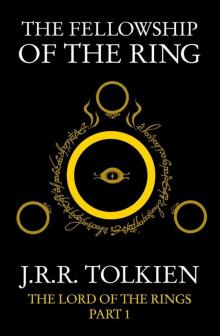 The Fellowship of the Ring
The Fellowship of the Ring The Hobbit
The Hobbit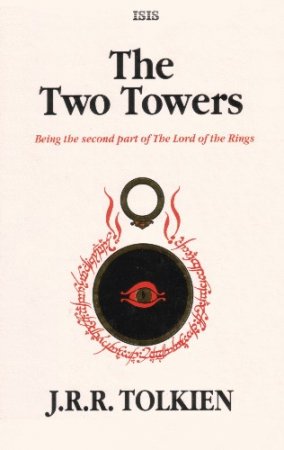 The Two Towers
The Two Towers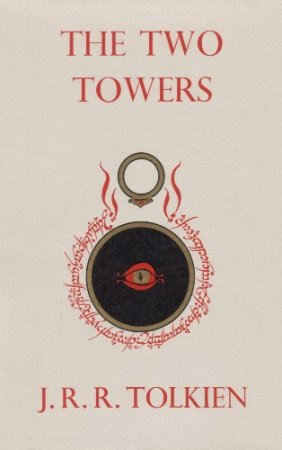 The Return of the King
The Return of the King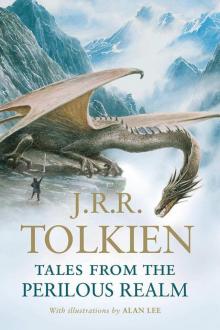 Tales From the Perilous Realm
Tales From the Perilous Realm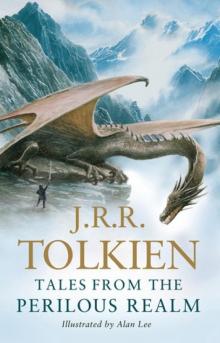 Leaf by Niggle
Leaf by Niggle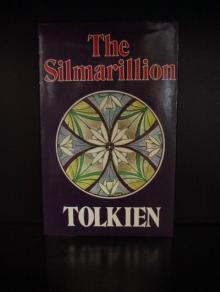 The Silmarillon
The Silmarillon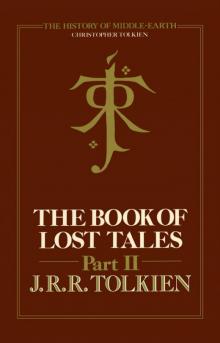 The Book of Lost Tales, Part Two
The Book of Lost Tales, Part Two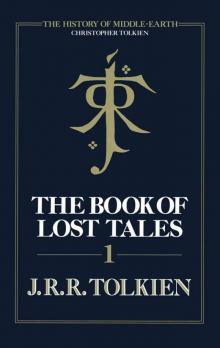 The Book of Lost Tales, Part One
The Book of Lost Tales, Part One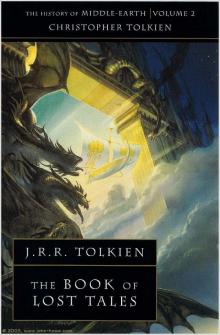 The Book of Lost Tales 2
The Book of Lost Tales 2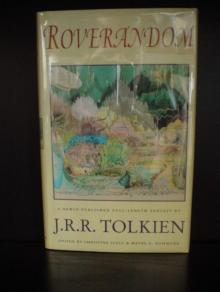 Roverandom
Roverandom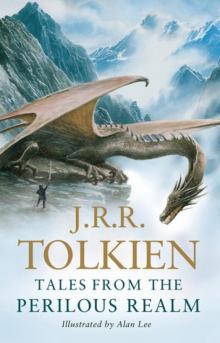 Smith of Wootton Major
Smith of Wootton Major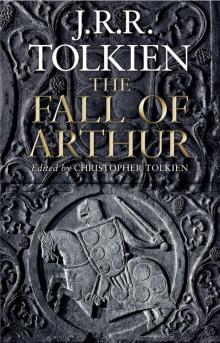 The Fall of Arthur
The Fall of Arthur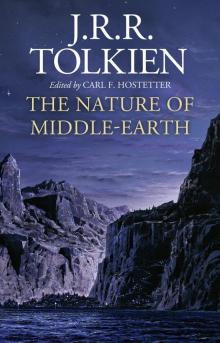 The Nature of Middle-earth
The Nature of Middle-earth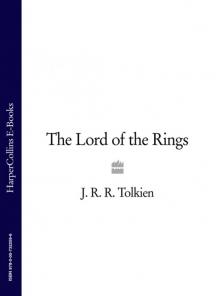 The Lord of the Rings: The Fellowship of the Ring, The Two Towers, The Return of the King
The Lord of the Rings: The Fellowship of the Ring, The Two Towers, The Return of the King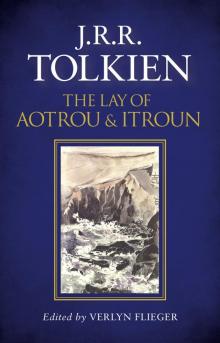 The Lay of Aotrou and Itroun
The Lay of Aotrou and Itroun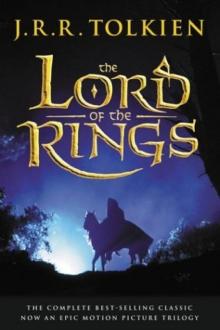 lord_rings.qxd
lord_rings.qxd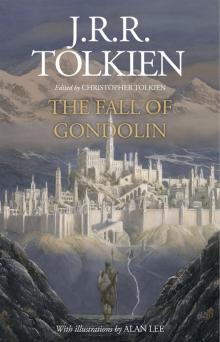 The Fall of Gondolin
The Fall of Gondolin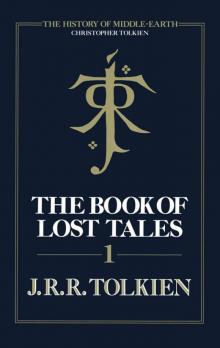 The Book of Lost Tales, Part 1
The Book of Lost Tales, Part 1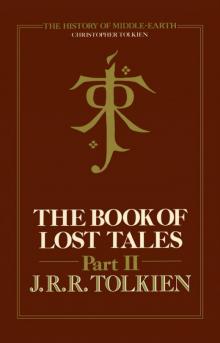 The Book of Lost Tales, Part 2
The Book of Lost Tales, Part 2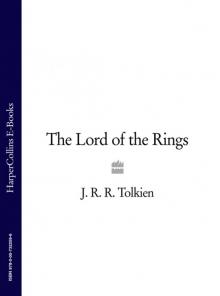 The Lord of the Rings
The Lord of the Rings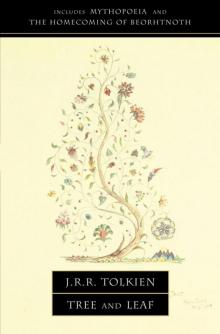 Tree and Leaf
Tree and Leaf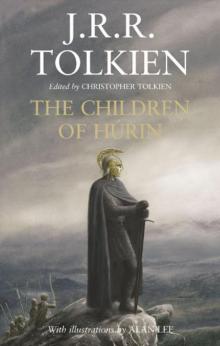 The Children of Húrin
The Children of Húrin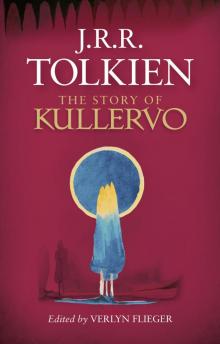 The Story of Kullervo
The Story of Kullervo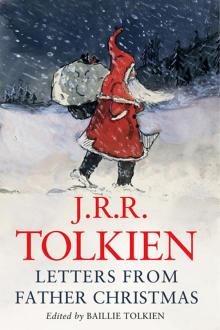 Letters From Father Christmas
Letters From Father Christmas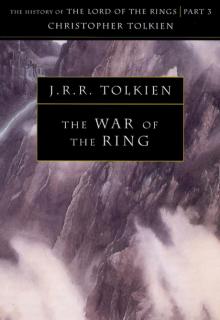 The History of Middle Earth: Volume 8 - The War of the Ring
The History of Middle Earth: Volume 8 - The War of the Ring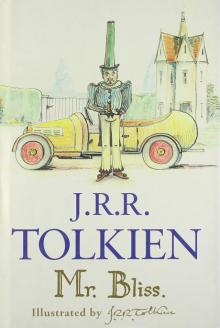 Mr. Bliss
Mr. Bliss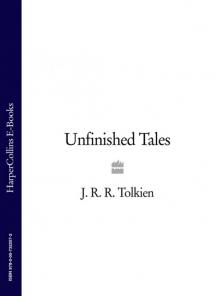 Unfinished Tales
Unfinished Tales The Adventures of Tom Bombadil
The Adventures of Tom Bombadil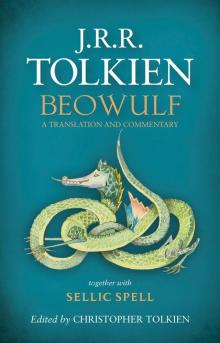 Beowulf: A Translation and Commentary, together with Sellic Spell
Beowulf: A Translation and Commentary, together with Sellic Spell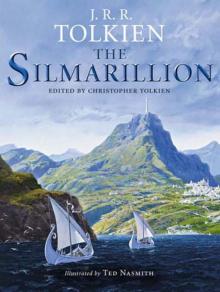 The Silmarillion
The Silmarillion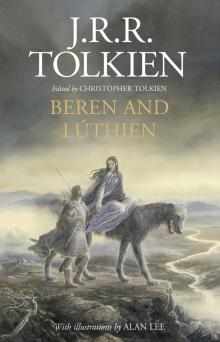 Beren and Lúthien
Beren and Lúthien